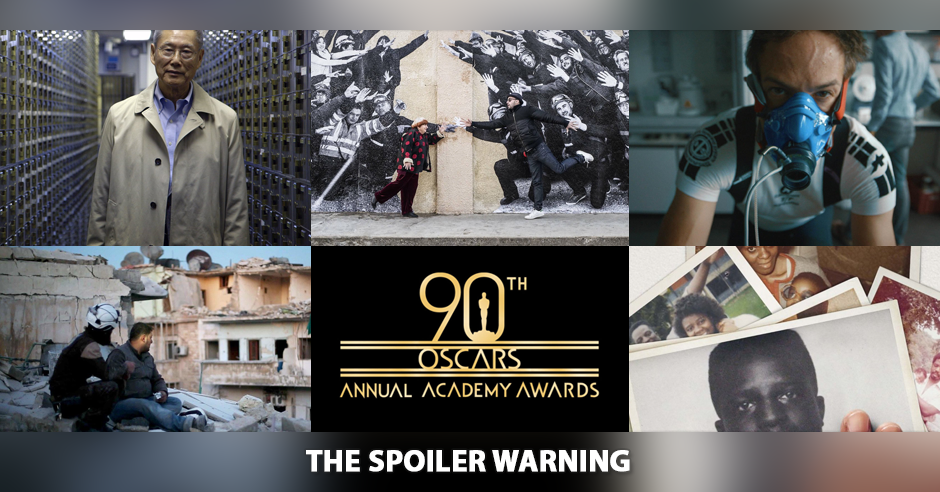It’s tough to review a documentary. Like any genre, there’s no clear metric to judge it by because there’s no single goal they share. Some aim to provoke, others to inspire; some are didactic deep-dives, others meditative character portraits. Some, as we find this year, are desperate cries for help. The difference with the documentary format, is that some things are out of the filmmaker’s control. Can the director be blamed for a “weak” character arc? “Obvious” melodrama? Likewise, can they honestly be praised for a compelling twist they’ve seemingly stumbled into? Is it happenstance or found art? Does the distinction even matter?
I don’t have the tools to properly critique the five Oscar-nominated documentaries. All I can do is tell you how — given my own limited, flawed, subjective point of view — they impacted me. Some made me smile. Others nearly brought me to tears, and provoked sharp, political anger. Others frustrated me via some disconnect between content and form. All of them are available on major streaming platforms, and deserve to be wrestled with on your own terms. Brief reviews, in order of episode discussion:
- Icarus set out to be the Super Size Me of bicyclist doping, but ends like the Tickled or Citizenfour of Russian Olympic fraud. Like the latter Snowden doc, it is only valuable for its (fabulously lucky) access: filmmaker Bryan Fogel’s ability to weave a coherent narrative is virtually nonexistent, and much of the buildup to the Russian scandal is frustratingly opaque — even when the story virtually writes itself. It’s worthwhile as a time capsule, but largely artless as a doc. Your mileage may vary.
- Strong Island might be the most difficult of the bunch to discuss, because I feel it veers into the other extreme: artful at the expense of relatable authenticity. Yance Ford’s exploration of their brother’s absurdly unjustified murder, and the egregious failure of the justice system to bring it to trial, is heartfelt, personal, and deeply relevant today. In an attempt to channel that loss, though, Ford often turns the camera inward — and that tug-of-war, between the attempted naturalism of a grief observed and the inherent self-consciousness of grief directed and edited and re-shot, was a bitter pill for me to swallow. Every possible angle (a bias-damning procedural, an exploration of familial grief, a personal tribute to how loss impacts the filmmaker’s identity) is valid and powerful in its own way, but it felt like they never quite committed to which she wanted to tell. This is one instance where I think the whole is somehow less than its parts.
- Last Men In Aleppo is somehow both the most difficult to watch and the one I most full-throatedly endorse. A Syrian-directed film following the lives of a volunteer rescue group in Aleppo, it’s an absolutely gut-wrenching experience: in the first ten minutes we watch cluster bombs level residential buildings, men pull children (some living, some lost) from the rubble, and familial survivors howl with grief…all with a relentless intensity which Kathryn Bigelow would struggle to imitate. We see heroism, depression, relief, numbness, and — against all odds — tiny glimmers of joy, as families strain to carve normalcy out of a chaotic world. Like the best films, its slice-of-life humanism serves as a shortcut to empathy, shining a spotlight on lived-in experiences which we might otherwise ignore. As the credits rolled, I couldn’t help but feel all that sadness transmuting into anger: how dare we sit in ugly abundance while so many struggle to survive? How dare we give pursed lip-service to “feeling their pain” while refusing them shelter due to some incremental 0.000001% risk to our unearned well-being? When cities are being leveled and innocent children are hurting, what right do we have to expect normalcy, to demand it for our own quarantined spaces? “America first” can rot and burn. People first, always.
- Abacus: Small Enough To Jail is a provocative, topical drama which skirts a perfect line between lightness and outrage. It follows the Sung family, owners of a small bank servicing immigrants in NYC’s Chinatown, who were the first — and only — institution to be indicted following the 2008 housing crash. The case against them is almost laughably flimsy, and the defendants (a patriarch who likens himself to Jimmy Stewart in It’s A Wonderful Life, a mother who just wants out of the spotlight, and their go-get-em nose-to-the-grindstone daughters) are just about the nicest people a government could choose to humiliate and crush. In addition to being a gripping courtroom drama and a charming portrait of a tight Chinese family, it raises several issues relevant today: the distinction between the letter of the law and the spirit of the law, the need for prosecutorial discretion in choosing which “crimes” to punish, and the scapegoating of others’ specks while our own planks grow daily. A lovely little film, with substance to boot.
- Faces Places is also a lovely little film, but I can’t quite make the case for it being a /substantial/ one. Effectively an French sequel to the Steve Coogan “Trip” movies, the film follows legendary filmmaker Agnès Varda and young artist/muralist JR as they drive through the countryside making art. Specifically, they photograph strangers (an elderly woman living in a deserted block, a farmer, a young mother, a goat, the wives of three stevedores) and paste their blown-up portraits on the side of existing structures. It’s a whimsical examination of art — both the joy of creating it, and the empowering thrill of seeing oneself reflected in it. I’m sure French New Wave fans will glean much deeper layers of meaning; mine was as a breezy, pleasant escape.
Chris and I discuss all five films, and a good bit of politics, in our bonus omnibus review:
